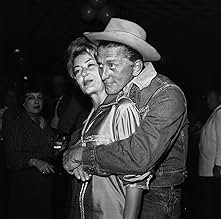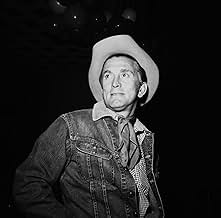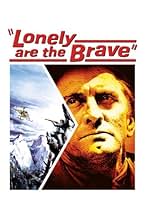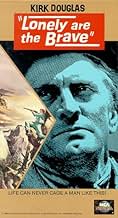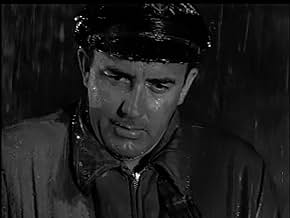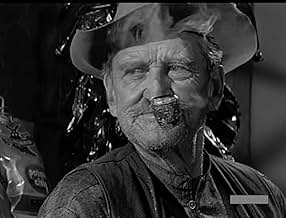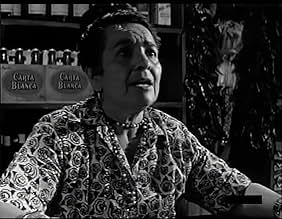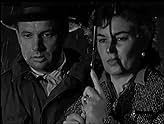AVALIAÇÃO DA IMDb
7,5/10
11 mil
SUA AVALIAÇÃO
Um cowboy feroz se tranca na prisão para escapar com um velho amigo.Um cowboy feroz se tranca na prisão para escapar com um velho amigo.Um cowboy feroz se tranca na prisão para escapar com um velho amigo.
- Direção
- Roteiristas
- Artistas
- Indicado para 1 prêmio BAFTA
- 1 vitória e 2 indicações no total
William Mims
- First Deputy Arraigning Burns
- (as Bill Mims)
John Barton
- Prisoner
- (não creditado)
Ray Beltram
- Bar Patron
- (não creditado)
Audrey Betz
- Bar Patron
- (não creditado)
Bill Bixby
- Airman in Helicopter
- (não creditado)
Eumenio Blanco
- Prisoner
- (não creditado)
Oscar Blank
- Prisoner
- (não creditado)
Don Carlos
- Bar Patron
- (não creditado)
- Direção
- Roteiristas
- Elenco e equipe completos
- Produção, bilheteria e muito mais no IMDbPro
Avaliações em destaque
Released in 1962 and directed by David Miller from a novel by Edward Abbey, "Lonely are the Brave" is a Western taking place in modern times (the early 60s, that is) starring Kirk Douglas as Jack Burns, an independent New Mexican cowhand who's a likable loner. He lands himself in jail in order to help his old friend, Paul (Michael Kane), who is doomed for the penitentiary for a couple of years; but Paul doesn't want to escape because it would add several years to his sentence if caught. So Burns breaks out on his own and is chased by Sheriff Johnson (Walter Matthau) and others (George Kennedy) with the aid of a military helicopter, etc. Will he get away? Gena Rowlands is on hand as Paul's wife.
This modern Western cogently conveys how civilization with its corresponding government and never-ending laws naturally squelches personal independence and freedom. The bigger the populace means the bigger the governing regulations, and the less the liberty. One starts to suffocate in a world of borders, fences and laws. These are human-made inventions that don't even exist. Fly over the USA and you'll see no state or county borders or city limits. They're all human-made inventions that don't exist, except in a legal sense. Burns hearkens back to an earlier era where one didn't even need an ID. He doesn't fit into the mold of the modern world. All he has is his mare, Whiskey, the clothes on his back and his basic necessities. They're all a real cowboy needs, but the cowboy was a vanishing breed circa 1961.
Director Miller wisely accentuates Gena's curvy beauty as Paul's wife, Jerri. The nature of her relationship with Burns is initially a mystery, but all is revealed before the final act and it's well done. Whether someone is married or not, it doesn't mean s/he can't love someone else who's single or married. But marriage itself is a border that cannot be lawfully crossed except by the person's spouse. The film acknowledges this and so do Burns and Jerri. They're people with feelings, but they're also wise and hence don't allow their passions to compel them to trespass marital fences.
All these items amongst others (like the quality score) make "Lonely are the Brave" a minor near-masterpiece. Unfortunately, it's flawed by some tedious stretches, like the overlong jail sequence, and unconvincing or dumb elements; for instance, the idea that Burns wouldn't know enough to make sure there weren't any cars before crossing a highway on horseback (Seriously?). It's also marred by B&W photography, which would've really come alive if shot in color. The basic plot and theme were done later by the superior "First Blood" (1982) and "The Electric Horseman" (1979) respectively.
The film runs 107 minutes and was shot in the Albuquerque, New Mexico, area.
GRADE: B+
This modern Western cogently conveys how civilization with its corresponding government and never-ending laws naturally squelches personal independence and freedom. The bigger the populace means the bigger the governing regulations, and the less the liberty. One starts to suffocate in a world of borders, fences and laws. These are human-made inventions that don't even exist. Fly over the USA and you'll see no state or county borders or city limits. They're all human-made inventions that don't exist, except in a legal sense. Burns hearkens back to an earlier era where one didn't even need an ID. He doesn't fit into the mold of the modern world. All he has is his mare, Whiskey, the clothes on his back and his basic necessities. They're all a real cowboy needs, but the cowboy was a vanishing breed circa 1961.
Director Miller wisely accentuates Gena's curvy beauty as Paul's wife, Jerri. The nature of her relationship with Burns is initially a mystery, but all is revealed before the final act and it's well done. Whether someone is married or not, it doesn't mean s/he can't love someone else who's single or married. But marriage itself is a border that cannot be lawfully crossed except by the person's spouse. The film acknowledges this and so do Burns and Jerri. They're people with feelings, but they're also wise and hence don't allow their passions to compel them to trespass marital fences.
All these items amongst others (like the quality score) make "Lonely are the Brave" a minor near-masterpiece. Unfortunately, it's flawed by some tedious stretches, like the overlong jail sequence, and unconvincing or dumb elements; for instance, the idea that Burns wouldn't know enough to make sure there weren't any cars before crossing a highway on horseback (Seriously?). It's also marred by B&W photography, which would've really come alive if shot in color. The basic plot and theme were done later by the superior "First Blood" (1982) and "The Electric Horseman" (1979) respectively.
The film runs 107 minutes and was shot in the Albuquerque, New Mexico, area.
GRADE: B+
Kirk Douglas has said that "Lonely Are The Brave" is his absolute favorite of all the movies he has done. It doesn't take much thought to determine why he feels this way. The movie's central character, Jack Burns, is a non-conformist, someone who always does things his way no matter what society may tell him differently. There are few other movie protagonists like this one. Other merit found in the movie includes some tense moments while Jack is on the run, plus a gutsy and unconventional ending that you probably couldn't get away with today.
If there is a flaw to be found in this good movie, it may be that some modern day viewers may object to the pacing. It takes about half of the movie before Jack is on the run, and some scenes do seem to run a little longer than they should. While every scene DOES provide some purpose, I think the movie would have been improved had several scenes been cut down in length slightly. But even without this correction, the movie is never boring and is always interesting.
If there is a flaw to be found in this good movie, it may be that some modern day viewers may object to the pacing. It takes about half of the movie before Jack is on the run, and some scenes do seem to run a little longer than they should. While every scene DOES provide some purpose, I think the movie would have been improved had several scenes been cut down in length slightly. But even without this correction, the movie is never boring and is always interesting.
There are many things weighing in favor of this film: David Miller's direction is assured, honest, competent, and perceptive; Douglas, Matthau and Rowlands all post wonderful performances; photography is superlative; action sequences are of the highest order; and the script, especially the dialogue, by Donald Trumbo, is very good.
Unfortunately, it is built upon a questionable premise. Even the most idealistic of souls has to know that you do not commit crimes to be taken into jail to release your brother, but first you ask him if he is willing to go along with that project. Fortunately, Douglas' brother is much wiser than he and refuses to break out of jail.
Freedom-loving, idealistic Douglas has some strange quirks, not to mention a questionable military service record that includes a Purple Heart, and good civilian deeds besides beating up officers of the law. For somebody who apparently loves freedom so dearly, it is really strange that he has no idea how prison limits your freedom, especially because he had been in detention during his military service.
The film gathers momentum when Douglas is on the run and police after him, but you know that things are not going to go well. Best single aspect in the whole movie: Douglas' love for his mare, Whisky. Plaudits for the trainers who managed to get the animal to perform so convincingly in such a difficult environment, both on the mountains and in the streets.
I liked Matthau's understated performance and the way his character understands Douglas' motivations, but the law, even in 1962, did not allow cop offenders to get off so easy. Well deserved 7/10, a more credible premise would easily raise it to 9/10.
Unfortunately, it is built upon a questionable premise. Even the most idealistic of souls has to know that you do not commit crimes to be taken into jail to release your brother, but first you ask him if he is willing to go along with that project. Fortunately, Douglas' brother is much wiser than he and refuses to break out of jail.
Freedom-loving, idealistic Douglas has some strange quirks, not to mention a questionable military service record that includes a Purple Heart, and good civilian deeds besides beating up officers of the law. For somebody who apparently loves freedom so dearly, it is really strange that he has no idea how prison limits your freedom, especially because he had been in detention during his military service.
The film gathers momentum when Douglas is on the run and police after him, but you know that things are not going to go well. Best single aspect in the whole movie: Douglas' love for his mare, Whisky. Plaudits for the trainers who managed to get the animal to perform so convincingly in such a difficult environment, both on the mountains and in the streets.
I liked Matthau's understated performance and the way his character understands Douglas' motivations, but the law, even in 1962, did not allow cop offenders to get off so easy. Well deserved 7/10, a more credible premise would easily raise it to 9/10.
Based on the novel "Brave Cowboy" by Edward Abbey, David Miller ably directs this Dalton Trumbo-scripted film about a modern day cowboy in New Mexico who gets himself thrown into jail when he finds that a friend is there. He plans on breaking the two of them out. The friend refuses to go, out of concerns for his family and not wanting to be on the run afterward, but the cowboy goes, heading on horseback to the mountains and, hopefully, Mexico, with the law on his tail using modern technology to try to track him down.
Director Miller and cinematographer Philip Tathrop splendidly capture the beauty, as well as ruggedness, of the American southwest in the scenes of pursuit with some truly striking black and white photography. The film's opening scene, in fact, with Douglas relaxing, his hat over his eyes, as he lies on the ground, a moment seen in so many other westerns, the peace suddenly shattered by the sonic sounds of jets flying overhead, is a wonderful metaphor for what is to follow. The film also features a remarkably well staged and intense bar fight between the cowboy and a mean spirited one armed veteran (played by an unbilled Bill Raisch, best known for television's The Fugitive series).
Douglas delivers one of his most relaxed and engaging performances as Jack Burns, a loner, as he calls himself, whose greatest love is for a horse, Whiskey, to whom he talks and gently scolds, at times, throughout the film. At the same time, though, the actor, has great chemistry with Gena Rowlands as the wife of his imprisoned friend. There's an unspoken special feeling between these two when they first sight one another in the film, and they afterwards share a few moments of great sensitivity. It's a shame that Douglas and Rowlands were never re-teamed on screen again.
Another highly effective performance in the film is that of Walter Matthau, as a gum chewing, laid back sheriff, in charge of pursuing Douglas in the wild countryside but who, for two cents, would probably just as soon like to see the cowboy get away. And, in contrast to Matthau, there is a mean spirited George Kennedy as a nasty prison guard who enjoys tormenting and beating up prisoners.
Lonely Are The Brave has a memorable,finale, one that will stay with you, as much as Douglas's quite extraordinary performance. This film is a little gem that is available on DVD and occasionally shown on Turner Classic Movies. Do yourself a favor and watch it if you can. You won't be disappointed.
Director Miller and cinematographer Philip Tathrop splendidly capture the beauty, as well as ruggedness, of the American southwest in the scenes of pursuit with some truly striking black and white photography. The film's opening scene, in fact, with Douglas relaxing, his hat over his eyes, as he lies on the ground, a moment seen in so many other westerns, the peace suddenly shattered by the sonic sounds of jets flying overhead, is a wonderful metaphor for what is to follow. The film also features a remarkably well staged and intense bar fight between the cowboy and a mean spirited one armed veteran (played by an unbilled Bill Raisch, best known for television's The Fugitive series).
Douglas delivers one of his most relaxed and engaging performances as Jack Burns, a loner, as he calls himself, whose greatest love is for a horse, Whiskey, to whom he talks and gently scolds, at times, throughout the film. At the same time, though, the actor, has great chemistry with Gena Rowlands as the wife of his imprisoned friend. There's an unspoken special feeling between these two when they first sight one another in the film, and they afterwards share a few moments of great sensitivity. It's a shame that Douglas and Rowlands were never re-teamed on screen again.
Another highly effective performance in the film is that of Walter Matthau, as a gum chewing, laid back sheriff, in charge of pursuing Douglas in the wild countryside but who, for two cents, would probably just as soon like to see the cowboy get away. And, in contrast to Matthau, there is a mean spirited George Kennedy as a nasty prison guard who enjoys tormenting and beating up prisoners.
Lonely Are The Brave has a memorable,finale, one that will stay with you, as much as Douglas's quite extraordinary performance. This film is a little gem that is available on DVD and occasionally shown on Turner Classic Movies. Do yourself a favor and watch it if you can. You won't be disappointed.
I pity those who cannot, even in a small way, identify with Douglas' character, Jack Burns in this ageless work of art. This is a self described 'lonely man,' of no use to his true love( who has married his old friend) because he cannot share his life with anyone. He acknowledges that he is of no use to anyone. Rather he is a constant threat to whatever social order he encounters. The one time he makes a commitment, to his horse no less, he loses his edge. And probably his freedom. What a wonderful movie this is.It steeps itself in the fading of the West. While much of it is seemingly allegorical, there is also a truthfulness, and a tenderness in Burns search for escape over the mountains. Someone else has commented on the similarities between Burns and Bogart's rendition of Roy Earle in HIGH SIERRA. Surely any thoughtful movie goer has experienced that rush to the mountains, that sense that time has passed you by and you are not of this place.
Você sabia?
- CuriosidadesThe one-armed man (Bill Raisch) tells John W. "Jack" Burns (Kirk Douglas) in the bar that he lost his arm at Okinawa during World War II. Raisch lost his right arm in a fire on-board a ship during that conflict. He was Burt Lancaster's stand-in, and later landed a recurring role, as the real killer of Dr. Richard Kimble's wife, on O Fugitivo (1963).
- Erros de gravaçãoAt the 1:33 mark, whilst Burns is resting with his horse, Whisky, under a tree, you can see a thin black line attached to the horse's bit, coming in from the left. It appears that it is being pulled on by a crew member to keep Whisky's head up from where she is grazing.
- Citações
Jack Burns: I didn't want a house. I didn't want all those pots and pans. I didn't want anything but you. It's God's own blessing I didn't get you.
Jerri Bonds: Why?
Jack Burns: 'Cause I'm a loner clear down deep to my guts. Know what a loner is? He's a born cripple. He's a cripple because the only person he can live with is himself. It's his life, the way he wants to live. It's all for him. A guy like that, he'd kill a woman like you. Because he couldn't love you, not the way you are loved.
- Cenas durante ou pós-créditosthe credits at the beginning of the film use a font with uppercase consonants and lower case vowels (of various sizes) , but for the names only.
- ConexõesFeatured in Walter Matthau: Diamante em Bruto (1997)
- Trilhas sonorasOh! Susanna
Composed by Stephen Foster
Principais escolhas
Faça login para avaliar e ver a lista de recomendações personalizadas
- How long is Lonely Are the Brave?Fornecido pela Alexa
Detalhes
Bilheteria
- Orçamento
- US$ 2.000.000 (estimativa)
- Tempo de duração1 hora 47 minutos
- Cor
- Proporção
- 2.39 : 1
Contribua para esta página
Sugerir uma alteração ou adicionar conteúdo ausente

Principal brecha
By what name was Sua Última Façanha (1962) officially released in India in English?
Responda

